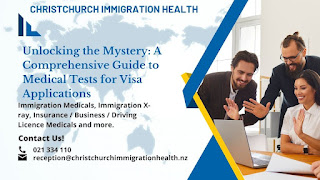Unlocking the Mystery: A Comprehensive Guide to Medical Tests for Visa Applications
If you're planning to apply for a visa, you may be required to undergo a medical examination to ensure that you're healthy and free from communicable diseases. But what exactly does the medical test for visa entail? In this comprehensive guide, we'll take a closer look at the various components of the medical test, including blood tests, physical exams, and X-rays, and explain what the examining physician will be looking for.
From tuberculosis to HIV to mental health, we'll cover all the bases and help you feel prepared and informed before you head to your appointment. Don't let the medical test for visa be a mystery – unlock its secrets with this must-read guide.
Chest X Rays
A chest X-ray is a non-invasive medical imaging test that uses electromagnetic waves to capture images of the chest, including the lungs, heart, blood vessels, and bones. The test involves standing in front of a machine and holding your breath while the X-ray beam passes through your chest to produce an image on a digital screen.
Chest X-rays are commonly used to diagnose and monitor conditions such as pneumonia, lung cancer, tuberculosis, and heart failure. In the context of visa applications, a chest X-ray is often required to check for the presence of active tuberculosis or other respiratory diseases that could pose a risk to public health.
Medical Examination
Medical examinations are routine tests performed by licensed medical professionals to evaluate a person's overall health and wellness. These exams typically involve a thorough physical examination, as well as various diagnostic tests such as blood tests, urine tests, and imaging studies like X-rays. Medical examinations may be required for a variety of reasons, such as for employment or as part of a visa application process.
They are also important for preventative care, allowing doctors to identify potential health problems before they become serious. Depending on the purpose of the exam, certain tests may be emphasized or required, but the ultimate goal is always to assess and maintain a person's health.
Read More : E-Medical Consent
Hepatitis B and C tests
Hepatitis B and C tests are medical tests used to detect the presence of the hepatitis B or C virus in a person's blood. These tests are important because hepatitis B and C can cause serious liver damage if left untreated. The tests involve drawing blood from the individual and then analyzing the sample in a laboratory. If the virus is present, the test will show a positive result.
In the context of visa applications, hepatitis B and C tests may be required to ensure that the applicant is not carrying the virus and to prevent the spread of the disease. These tests may also be recommended as part of routine medical checkups or for individuals at higher risk of contracting the virus, such as healthcare workers or people who use intravenous drugs.
Who needs to get a medical examination
Several groups of people may need to undergo a medical examination for various reasons. For example, people who are seeking employment in certain industries, such as healthcare or food service, may be required to have a medical examination to ensure that they are healthy and fit to work.
Additionally, individuals applying for visas or permanent residency in some countries may need to undergo a medical examination to demonstrate that they are free of communicable diseases that could pose a risk to public health. People who have certain medical conditions or who are at high risk for certain diseases may also be advised to undergo routine medical examinations to monitor their health and detect any problems early.
Read More : - Immigration NZ E-Medical Consent



.jpg)
Comments
Post a Comment